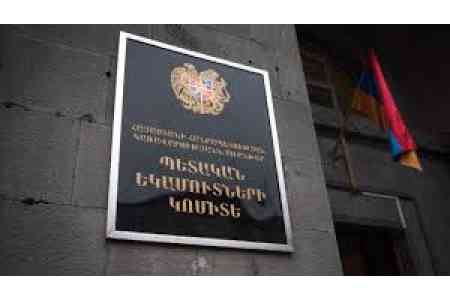


ArmInfo. Automatic exchange of information on financial accounts for tax purposes within the framework of the Common Reporting Standard (CRS) of the Organization for Economic Cooperation and Development (OECD) will affect only non-residents - legal entities and individuals.
This was stated by Anna Torosyan, Head of the Department for the Exchange of Financial Reporting and Control over Compliance with Legislation of the International Taxation Department of the State Revenue Committee (SRC), at a press conference on September 12.
As Torosyan indicated, as part of the process, the SRC will collect information on non-residents from commercial banks and investment companies. Then the information will be verified with the SRC databases, an analysis will be carried out, and the already processed data will be transferred to foreign partner tax authorities.
At the same time, the representative of the SRC emphasized that within the framework of the standard, the fact of tax residency is important, not citizenship. That is, in the presence of dual citizenship, the tax residency of the citizen will be taken into account when exchanging information.
"For tax purposes, individuals who have been in Armenia for 183 days or more during the tax year, or whose center of vital interests is in Armenia, are considered residents of the Republic of Armenia. The center of vital interests is the place where the family or economic interests of the person are concentrated. In particular, if his home (family residence), main personal or family property or place of main economic (professional) activity are located in Armenia. For a legal entity, the country of tax residence is the country in whose competent authority it is registered or where its place of actual management is located," she explained.
Within the framework of the standard, Armenia will automatically exchange financial accounts of non- residents with about 120 countries and geographic regions once a year on the principle of reciprocity. This year, the exchange of financial account information will be implemented on September 30, 2025 with about 47 countries.
The persons for whom the information is supposed to be exchanged will be duly notified by the relevant financial institution. If the said persons do not wish to exchange information about their accounts, the financial institution shall terminate business relations with them or shall not establish such relations, and the tax authority shall not exchange information about the accounts.
Anna Torosyan assured that the protection of collected and transmitted information is ensured at several levels. First, the information is transmitted from banks and investment companies in encrypted form, then the State Revenue Committee, through a special secure system implemented with the help of the OECD, will transmit it to partners according to the standard. "
Chief Tax Inspector of the Financial Reporting Exchange and Compliance Control Department of the International Taxation Department of the State Revenue Committee, Lia Ghukasyan, in turn, noted that at the moment, accountable financial organizations are commercial banks and investment companies operating in Armenia. In the future, this list may be expanded.
A non-resident's accountable financial accounts are newly opened and current savings and deposit accounts, depository data, and other accounts that fall under this standard. In particular, new accounts are considered to be those opened after January 1, 2024, and current accounts are those opened before December 31, 2023. Legal entities' data are subject to exchange if at the end of the year the total balance on all accounts exceeds $250 thousand or the equivalent in another currency. The data is provided for the calendar year preceding the reporting year. Accountable financial organizations transfer data on accountable financial accounts to the tax authority on December 31 of the calendar year.
Note that that the Organization for Economic Cooperation and Development (OECD), in the context of combating tax evasion and "gray" schemes, has developed and implemented a single standard for the exchange of fiscal data - the Common Reporting Standard (CRS). The Republic of Armenia, as a member of the OECD, joined the Common Reporting Standard (CRS) in 2024 for the automatic exchange of financial account information (AEOI). Tax authorities of countries that have implemented the standard will automatically exchange information on non-residents' financial accounts in financial institutions based on the principle of reciprocity. Within the framework of the standard, Armenia will automatically exchange non-residents' financial accounts with approximately 120 countries and geographic regions once a year based on the principle of reciprocity.